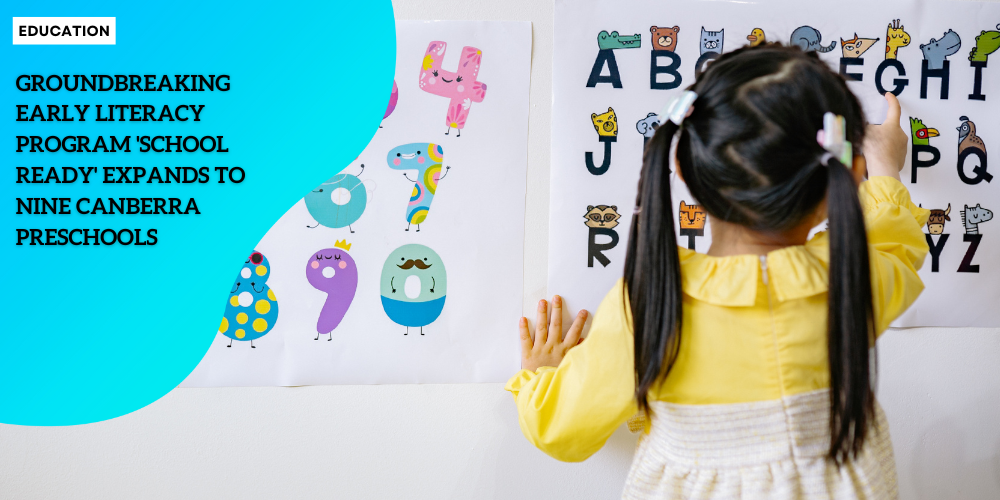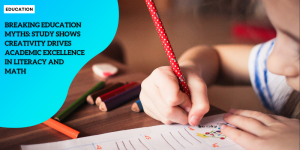Groundbreaking Early Literacy Program ‘School ReadY’ Expands to Nine Canberra Preschools

Anúncios
Introduction to School ReadY Program
This initiative, known for its success in Western Australia, looks to enhance the foundational skills of young learners before they embark on their formal schooling journey.
Play-Based Curriculum and Intentional Teaching
- The School ReadY program is rooted in a blend of play-based learning and intentional teaching practices. This dual approach ensures that children not only enjoy the engaging elements of play but also benefit from structured and purposeful educational experiences.
- Play-based activities are designed to be fun and engaging, fostering a love for learning while addressing critical areas like phonological awareness, narrative skills, and listening comprehension.
- Per Renee Chakaodza, a Perth literacy specialist at The Y, children who develop these crucial skills early on tend to show greater academic success down the line. The program’s emphasis on purposeful interaction during play allows educators to guide and support pre-literacy and oral language development effectively.
Focus on Early Literacy and Oral Language Skills
The School ReadY program places a significant focus on developing pre-literacy and oral language skills among young children. Skills such as phonological awareness—recognizing and working with sounds in spoken language—are vital for future reading and spelling abilities. By honing these early literacy skills through playful yet directed activities, children can build a strong foundation for their educational journey.
Furthermore, the program integrates narrative skills and listening comprehension, fostering a well-rounded literacy skill set. These elements are crucial as they help children understand and process information, communicate effectively, and develop strong reading habits. This comprehensive approach ensures that children are not only ready to read but also equipped to thrive in other academic areas.
Positive Impact and Future Focus
- As the program rolls out in Canberra, it draws inspiration from its success in Western Australia. Leah Taylor, general manager of CECG’s early learning centres, highlighted the importance of the program’s evidence-based approach combined with the engaging nature of play. The collaboration also aims to generate valuable data, monitored by La Trobe University, to share insights and best practices nationwide.
- The new partnership with School ReadY holds promise for addressing educational disparities, particularly for children from vulnerable families. As noted by Pam Betts, executive director of CECG, many children enter learning centers lacking the necessary vocabulary and phonological awareness. Programs like School ReadY aim to bridge this gap, ensuring all children have access to quality early education.
- This initiative represents a significant step towards shaping the academic futures of young learners in Canberra. By providing structured, evidence-based early literacy instruction within a play-based framework, School ReadY prepares children for success in school and beyond.
Key Components and Development Areas
Program Focus
The School ReadY program is designed to address three key developmental domains crucial for early childhood education: Social and Emotional Wellbeing, Numeracy, and Literacy and Language. Each of these domains is developed through a combination of play-based learning and intentional teaching practices, creating a wholesome learning environment for the children.
Literacy and Language Development
A significant part of the program’s literacy and language component emphasizes phonological awareness, narrative skills, and listening comprehension.
These foundational skills are critical for future academic success. Phonological awareness, in particular, involves recognizing and manipulating sounds in spoken language. Developing this skill early on is essential for reading and spelling proficiency later in life.
The program also prioritizes narrative skills, which help children understand the structure of stories. This enhances their ability to express themselves and comprehend written and spoken language. Listening comprehension is another key area, ensuring that children can understand and process verbal instructions and information.
Special Training for Teachers
- A crucial part of the School ReadY program is the specialized training teachers receive in phonological awareness instruction.
- This professional development ensures that educators are well-prepared to deliver targeted and effective literacy instruction. Teachers learn how to create engaging and supportive environments that foster children’s understanding of sounds, letters, and words, laying a strong foundation for their future learning.
To find out more about this subject go to this content:
The Current Crisis in School Leadership
Social and Emotional Wellbeing
Social and emotional wellbeing is another critical component of the program. School ReadY aims to create a nurturing environment where children can develop healthy relationships, regulate their emotions, and build a sense of self. This domain is integral to ensuring that children are ready not just academically, but also socially and emotionally, for the challenges of formal schooling.
Numeracy Skills
The numeracy component ensures that children develop basic mathematical skills in a fun and engaging way. Through hands-on activities and practical experiences, children learn to understand numbers, patterns, and basic mathematical concepts. This early exposure to numeracy sets the stage for more complex mathematical learning in the future.
By targeting these developmental areas, School ReadY addresses the holistic needs of young learners, preparing them for a lifetime of learning. This multifaceted approach recognizes that early childhood education is not just about academics, but also about nurturing well-rounded individuals who are ready to thrive in various aspects of life.
Evidence-Based Approach and Evaluation
The School ReadY program is deeply rooted in an evidence-based approach to teaching early literacy and language skills. This foundation ensures that the strategies and practices employed are grounded in research and have been demonstrated to be effective. The program’s efficacy is continuously monitored and evaluated by La Trobe University, reflecting a rigorous commitment to assessing and improving educational outcomes.
Positive Outcomes in Western Australia
School ReadY has already shown promising results in Western Australia. Dr. Tim McDonald, CEO of The Y in Western Australia, noted significant improvements in areas such as letter name and sound identification, semantic knowledge, and comprehension.
These early successes highlight the program’s potential to replicate its results across other regions, including Canberra. This data is especially encouraging as it underscores the program’s ability to enhance essential pre-literacy skills that are foundational for later academic success.
Comprehensive Data Collection
- One of the key elements that sets the School ReadY program apart is its commitment to comprehensive data collection. By systematically gathering data across various regions and demographics, the program can identify which strategies are most effective across different contexts.
- This approach facilitates ongoing improvement and allows for the sharing of best practices among educators nationwide. The insights gained from this data not only inform the program’s development but also contribute to the broader field of early childhood education.
Resource Sharing and Strategy Development
The data collected through the School ReadY program enables valuable resource sharing and strategy development among educators across Australia.
This collaborative approach ensures that educators have access to the latest evidence-based practices and can adapt their teaching methods to better meet the needs of their students. Leah Taylor, general manager of CECG’s early learning centers, emphasized the importance of this collaboration in generating data that can be shared throughout the country to enhance early childhood education.
By continually refining its methods based on robust data, the School ReadY program aims to provide children with the best possible start in their educational journey. This evidence-based framework not only supports the development of crucial literacy skills but also fosters a love for learning that can have long-lasting impacts.
As we continue to explore the broader benefits of the School ReadY program, it becomes clear that early childhood education plays a pivotal role in setting children up for future success.
Addressing Early Education Gaps
Nationwide, about one in six children aged 4-5 years are not enrolled in preschool or school.
This gap in early education is particularly pronounced among vulnerable families who face challenges such as housing, food security, and health concerns. Addressing this gap is crucial because the early years are a vital period for cognitive and language development.
Targeted Support for At-Risk Children
- The School ReadY program aims to provide extra support for children who need help with vocabulary and phonological awareness.
- These skills are foundational for reading and academic success. By focusing on these areas, the program helps to create a level playing field for all children, regardless of their background.
Importance of Phonological Awareness
Phonological awareness involves recognizing and working with sounds in spoken language. It is a critical skill for reading and spelling. As Pam Betts, the executive director of CECG, points out, phonological awareness is a predictor of later reading and spelling success.
Children who do not develop these skills before starting school may struggle academically. Therefore, the School ReadY program places a strong emphasis on teaching phonological awareness through intentional and structured activities.
Equal Access to Quality Education
The School ReadY program also focuses on ensuring equal access to quality early education. This is essential, particularly for vulnerable families.
No child should miss out on the life-changing opportunity of participating in high-quality early childhood education. Advocacy and support are key components of this initiative, helping families to prioritize early learning for their children despite other challenges.
Georgie Dent, a family advocate, emphasizes that equitable participation in high-quality early learning is the most powerful tool to address disadvantage and inequality. Programs like School ReadY are designed to bridge these gaps and provide all children with the same opportunities to succeed.
Creating a Rich Language Environment
- Jilly Tyler, an early childhood expert, notes that rich language environments are crucial for developing healthy, flexible brains ready for school.
- Modern family life can sometimes limit children’s exposure to rich language, impacting their ability to learn. The School ReadY program addresses this by creating environments where children are engaged in “serve and return” interactions, essential for cognitive and language development.
- By addressing these early education gaps, the School ReadY program not only supports children who need extra help but also aims to prepare all children, especially those from vulnerable backgrounds, for a successful start in their academic journey. This sets the stage for long-term academic success and personal growth.
- Now that we have explored the importance of addressing early education gaps and how the School ReadY program is designed to tackle these challenges, we can see how early development of literacy skills impacts long-term academic success and beyond.
Long-term Impact and Benefits
Investing in early literacy skills paves the way for a child’s lifetime of learning and achievement. The School ReadY program fundamentally impacts academic success by cultivating these abilities at a crucial stage.
Focusing on phonological awareness – the understanding of sounds within words – helps kids prepare for future reading and spelling tasks. This foundational skill is a predictor of success in learning to decode and spell words, which are key components of literacy.
Early Literacy Foundations
Early exposure to literacy skills through the School ReadY program aims to bridge gaps that could hinder children’s success. Phonological awareness, for instance, involves recognizing and working with sounds in spoken language. Developing this ability sets children up for future proficiency in reading and spelling.
This groundwork is vital as research indicates a solid connection between phonological awareness and later literacy skills. Without structured support, many children might struggle to acquire these crucial skills.
Preparing for Formal Schooling
The transition from preschool to formal schooling can be a significant challenge for young children. By embedding vital pre-literacy skills in the early stages, School ReadY ensures that children are better equipped to handle the demands of a structured educational environment.
Activities focused on phonological awareness, narrative skills, and listening comprehension foster a love for reading and improve language capabilities.
Lifelong Benefits
- The long-term benefits of the School ReadY program extend beyond immediate school readiness. Children who enter school with a strong foundation in literacy skills show greater confidence and are more likely to excel academically.
- This leads to fewer learning struggles down the road, reducing the need for intervention programs. Moreover, developing a love for learning early on can have a positive impact on a child’s overall educational journey.
- In conclusion, the School ReadY program is laying a robust foundation that aids children in their ongoing education, ensuring they enter school ready to thrive.
| Component | Description |
|---|---|
| 🧩 Play-Based Learning | Engaging children in fun activities to promote learning through play |
| 📚 Phonological Awareness | Helping children recognize and work with sounds in spoken language |
| 🎨 Narrative Skills | Developing the ability to understand and create stories |
| 🎧 Listening Comprehension | Enhancing children’s ability to understand and process verbal instructions |
| 👩🏫 Teacher Training | Specialized training for educators to teach phonological awareness and literacy skills effectively |






